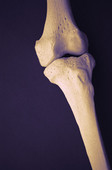
THURSDAY, Sept. 23 (HealthDay News) — Genetic factors that may predict severe osteoarthritis have been identified by U.S. scientists.
Their analysis of data from 1,154 osteoarthritis (OA) patients who were followed for up to 11 years found that those with X-ray evidence of knee arthritis who had a specific pattern of genetic variations on a gene located on chromosome 2 were nearly twice as likely as other patients to develop severe osteoarthritis.
The gene variants were detected on the interleukin-1 receptor antagonist (IL-1Ra) gene, which modulates many of immune and inflammatory responses in the body.
The findings will be presented this week at the World Congress on Osteoarthritis in Belgium.
Osteoarthritis is the leading cause of physical disability in the United States, but no drugs are approved to slow or halt disease progression. A major roadblock in the development of new OA drugs has been the inability to predict which OA patients are more likely to develop more severe disease. A genetic test that can identify these patients would be an important advance in efforts to develop new drugs, said the researchers.
“The strong association shown in this study between progressive OA and the IL-1Ra gene variations, as well as the body of previous related published research, might suggest that this IL-1Ra genetic information could be tested as a tool to identify high-risk patients for participation in clinical trials for the development of a much-needed disease modifying OA drug,” study leader Dr. Joanne Jordan, chief of the division of rheumatology, allergy and immunology at the Thurston Arthritis Research Center at the University of North Carolina at Chapel Hill, said in a university news release.
OA is one of the 10 most expensive medical conditions to treat, according to the U.S. Department of Health and Human Services. In 2005, OA treatment cost $34 billion, with joint replacement accounting for most of that total.
The study findings are from researchers at the University of North Carolina at Chapel Hill School of Medicine and Interleukin Genetics, Inc.
More information
The Arthritis Foundation has more about osteoarthritis.

